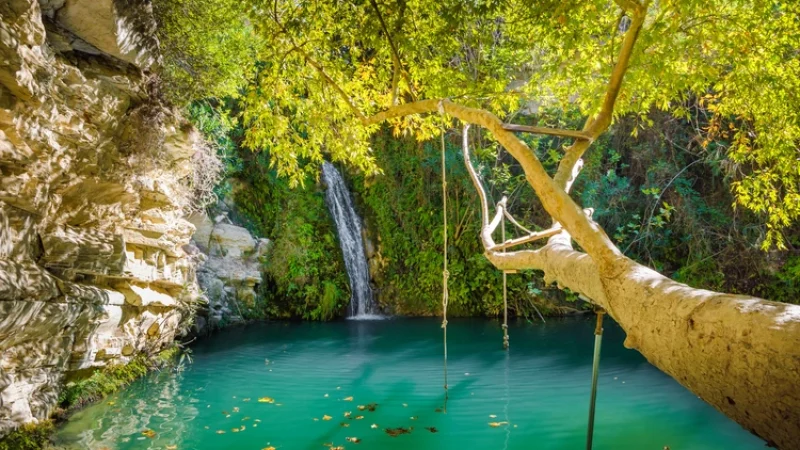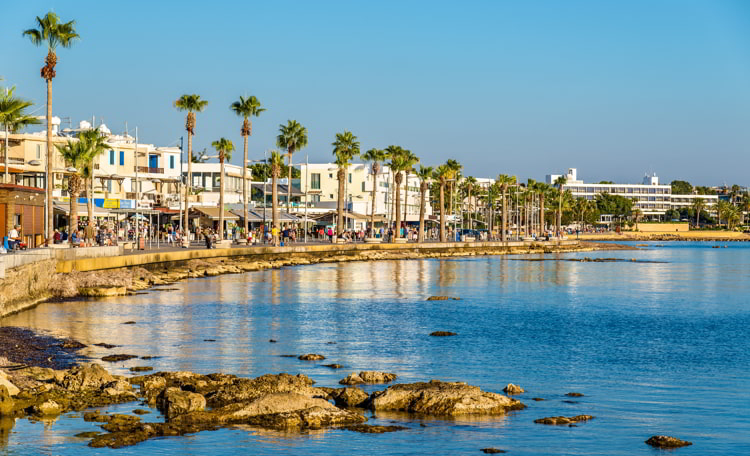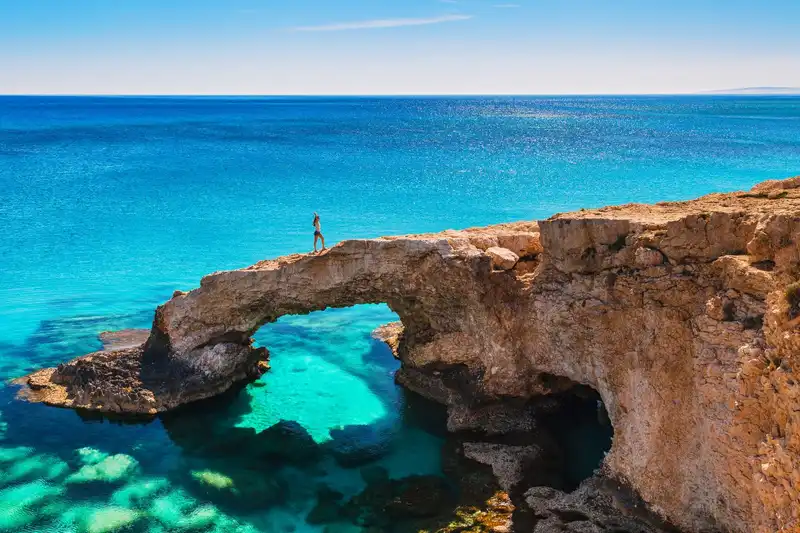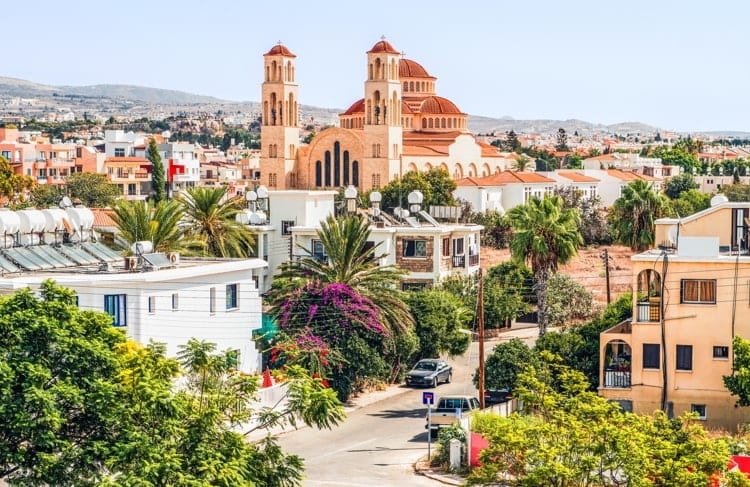Nevertheless, Cyprus is a popular tourist destination, drawing visitors with its sunny climate, stunning beaches, and cultural attractions. Whether exploring archaeological wonders, enjoying the sun-drenched beaches, or savoring the island’s culinary delights, Cyprus invites visitors to immerse themselves in its rich tapestry of history and natural beauty.
Cyprus boasts a Mediterranean climate that is characterized by long, hot summers and mild winters. This climate, influenced by its geographical location and the surrounding sea, contributes to the island’s appeal as a year-round destination for travelers seeking diverse experiences.
The Mediterranean Sea significantly influences Cyprus’ climate, acting as a natural regulator of temperatures. The sea retains heat during the summer, moderating coastal temperatures, while in winter, it releases stored warmth, preventing extremely low temperatures. This maritime influence contributes to the island’s overall climate stability.
Cyprus also exhibits microclimates due to its varied topography. The coastal regions, with their proximity to the sea, experience milder temperatures compared to the inland areas.
The Troodos Mountains, with peaks exceeding 6,398 feet, create a cooler and more temperate climate in their higher elevations.
And while Cyprus generally enjoys a mild and temperate climate, extreme weather events can occur.
Heatwaves, with temperatures soaring well above 104°F, can occasionally impact the island during the peak of summer. Conversely, in winter, especially in the Troodos Mountains, snowfall can create picturesque scenes, attracting those seeking winter sports.
Spring In Cyprus
Spring, from March to May, brings a burst of color to Cyprus as wildflowers bloom, and the countryside comes alive. Temperatures gradually rise during this season, with daytime temperatures ranging from 63°F to 77°F.
Most importantly, spring is a delightful time to witness the island’s diverse flora, from almond blossoms in February to the vibrant wildflowers that carpet the landscape.
Spring is also an excellent time for outdoor activities such as cycling, bird-watching, and exploring the island’s archaeological treasures without the intensity of summer heat. During this time, the sea also begins to warm up, inviting early-season swimmers to enjoy the coastal waters.
Summer In Cyprus
The summer months in Cyprus, spanning from June to August, are synonymous with high temperatures and abundant sunshine. Coastal areas experience daytime temperatures often exceeding 86°F and occasionally reaching into the 100s °F. The sea temperature becomes comfortably warm, inviting locals and tourists alike to indulge in the island’s pristine beaches.
Inland areas, particularly in the central plains and foothills, can experience even higher temperatures during the peak of summer.
The Troodos Mountains provide a respite from the heat, with temperatures generally cooler at higher elevations. This season is ideal for sunbathing, water sports, and exploring archaeological sites.
Autumn In Cyprus
As summer transitions to autumn, Cyprus experiences a gradual cooling, making this season particularly pleasant for outdoor activities. September still retains some summer warmth, with temperatures gradually decreasing as the season progresses. Daytime temperatures in autumn typically range from 77°F to 86°F, providing a comfortable environment for exploration.
Autumn is also the time when Cyprus receives its first rains after the dry summer months. This rainfall rejuvenates the landscape, turning the countryside into a lush green paradise. It’s an ideal time for nature walks, hiking in the Troodos Mountains, and visiting the island’s picturesque villages.
Climate In Cyprus: Winter
Winter in Cyprus, from December to February, is characterized by mild temperatures, especially along the coast. Daytime temperatures typically range from 54°F to 64°F, while nighttime temperatures can drop to around 43°F to 54°F.
The Troodos Mountains may experience colder temperatures and even occasional snowfall, making it a unique destination for those seeking a winter wonderland.
While winter is considered the rainy season in Cyprus, the precipitation is moderate compared to other Mediterranean regions. Rain showers are often short-lived, interspersed with sunny intervals. This season is conducive to exploring historical sites, enjoying cultural events, and experiencing local traditions.
Cyprus, with its Mediterranean climate, offers a diverse and inviting environment throughout the year. From the sun-soaked beaches of summer to the vibrant landscapes of spring and the occasional winter dusting of snow in the mountains, Cyprus provides a multifaceted experience for travelers.
The island’s climate, shaped by its geographical features and maritime influences, ensures that visitors can tailor their experiences based on personal preferences, whether seeking sunbathing bliss, cultural exploration, or outdoor adventures in the embrace of nature.
Famagusta is a bustling hub, blending historic charm with contemporary life, offering visitors a glimpse into Cyprus’s complex past and vibrant present. Located on the east coast of Cyprus, this city is known for its ancient city walls and medieval architecture– tourists love to explore the abandoned iconic medieval city of Varosha, Othello’s Tower, and the Lala Mustafa Pasha Mosque.
Because of its cultural significance, the ideal time to visit Famagusta would be in autumn, because this weather is the most comfortable for cultural exploration, historical site visits, and enjoying outdoor activities with fewer crowds.
Nestled on the northern coast of Cyprus, Kyrenia is a picturesque town with fascinating history and natural beauty. The charming harbor is dominated by the medieval Kyrenia Castle, which sets an impressive backdrop as its narrow streets are lined with traditional Cypriot houses.
The town boasts historical sites like the Bellapais Abbey and St. Hilarion Castle, echoing the island’s diverse past. Beyond history, Kyrenia offers a vibrant atmosphere with seaside cafes, bustling markets, and a view of the Mediterranean that complements its rich cultural heritage. And besides Famagusta, it is also one of the few Cypriot cities with a vibrant nightlife scene.
Kyrenia is a beautiful town that can be enjoyed any time of year. But because this city is the ‘tourism capital of Cyprus,’ it can be best enjoyed in the warmer weather during summer and autumn.
Larnaca, on Cyprus’ southern coast, is the oldest city in Cyprus. The palm-lined seafront invites leisurely strolls along Finikoudes Beach, while the Larnaca Salt Lake, home to flamingos in winter, adds a natural charm. The city’s centerpiece is the Church of Saint Lazarus, a revered pilgrimage site; its other main draw is its close proximity to the country’s international airport.
The best part of this city is its seaport, so naturally it would be best to visit Larnaca during the warmer months. However, as the city gets revitalized, in upcoming years it will certainly be more inviting to year-round tourism.
Renowned for its wine festivals and vibrant nightlife, Limassol epitomizes the perfect blend of tradition and modernity along the shores of the Mediterranean. The bustling promenade along Molos Park invites leisurely seaside walks, complemented by sandy beaches and azure waters.
Limassol Marina also blends modern architecture with a historic touch, housing restaurants and boutiques. The city hosts cultural events and festivals, while the medieval Limassol Castle and the famous archaeological site of Kourion showcase its rich history.
Because of all of the city’s offerings, and all of its modern amenities, Limassol truly can be enjoyed at any time of year.
Paphos, nestled on Cyprus’s southwestern coast, is a captivating blend of ancient mythology and contemporary allure. Its UNESCO-listed archaeological sites include the Tombs of the Kings and the Paphos Archaeological Park, which reveal millennia of history.
The city is also the mythical birthplace of Aphrodite, which perhaps contributes to its romantic ambiance– and the Petra tou Romiou rock formation echoes the goddess’s legend.
Modern Paphos seamlessly integrates these historical treasures with vibrant markets and high-end developments, making it a compelling destination on the shores of the Mediterranean.
Whether you’re interested in exploring Paphos’ archeological marvels, natural history, or exciting dining scene, Paphos can be enjoyed at any time of year– but its crowds will likely be less during spring and autumn.
Troodos, Cyprus’s mountainous heart, is a haven of natural beauty and cultural richness. Home to the island’s highest peak, Mount Olympus, Troodos enchants with pine-covered slopes, charming villages, and hiking trails.
The region houses picturesque monasteries, such as Kykkos Monastery, adorned with Byzantine art. And in winter, Troodos transforms into a serene snow-covered landscape, offering a unique winter retreat.
As such, Troodos’ natural beauty is perhaps at its peak in the winter months, although its weather certainly is at its harshest.
Nicosia
Nicosia is the capital of Cyprus and the last divided capital in the world, and its Green Line acts as a buffer zone between the Republic of Cyprus and the Turkish Republic of Northern Cyprus.
The Ledra Street crossing serves as a symbolic link between the two sides.
Nicosia’s Old Town boasts Venetian walls, medieval architecture, and the iconic Selimiye Mosque. Bustling markets, like the Laiki Geitonia, offer a taste of traditional Cypriot life, while contemporary cafes and galleries add a modern flair.
Nicosia can be enjoyed at any time of year, but if you choose to use it as a jumping-off point to other locations in Northern Cyprus, it is recommended you go in the summer months so you can enjoy the country’s famous beaches.















 . '
. '
 . '
. '
 . '
. '
 . '
. '
 . '
. '







